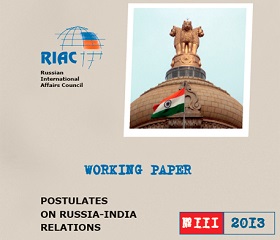Quite obviously, Russia and India cannot continue to bask in the assumption that the strategic partnership between Russia and India is a natural phenomenon. Convergence of national interests is a dynamic prism and it has to be re-positioned occasionally, so as to widely diffuse the gains of collaboration. This is one such occasion; while the world grapples with the emerging reality of a multi-polar world.
We are not going back to the world we knew. Politically, economically and socially the global pendulum has been swinging in multiple arcs, in an uncharacteristic manner. The present times demand that the nations should not start an argument between the past and the present; they need to focus single-mindedly on creating the type of future they want.
In an ever-more interconnected world, the relationships between nations now play a more significant role than ever before, in either accelerating or slowing down the realization of people’s aspirations in every nation. Each country, big or small, has to evolve an integrated foreign policy that fits all the jig-saw pieces into a coherent picture.
Specifically, the jig-saw for each nation needs to include all its continental neighbors and all relevant, big global players such as the USA, European Union, China, India and Russia.
It is axiomatic that the foreign policy configuration between any of the two global players is critical to maintaining the credibility of the integrated foreign policy of each of them. It is in this context that we have to explore the potential future scenarios of India-Russia Relations.
During the second half of the twentieth century, India and the then Soviet Union were generally perceived by the rest of the world as close allies. Though India was among the pioneers of the non-aligned movement concept, preponderance of socialist thinking and political necessity drew India closer to the Soviet Union. The Soviets also responded warmly by offering favorable defense and trade terms.
The same amiable equation continued after the formation of Russia in the early nineties. Somehow, India-Russia relationship did not mature or gain strength beyond that. Russia’s own economic problems and India’s stepping-out-in-the-world approach led to a sort of thaw, a sort of plateauing of the closeness. By nature, relationships never stand still. If they do not continuously improve, they run the risk of weakening, or at best they tend to become indifferent.
Today, in the second decade of the twenty first century, neither India nor Russia can build a future relationship on the legacy of the distant past. They are not the same countries they were even a decade ago; they both have a plethora of unresolved issues to settle in their own backyards.
They both need to identify a new congruity of interest between themselves and create a new platform for meaningful relations in the future. Hereafter, in the new era of sustainability, sustainable foreign relations between countries can only be built on a platform that acknowledges and aligns with the aspirations of the citizens of both countries.
There are five essential ingredients of a cross-border alignment of interests:
a) Trade relations that create net positive jobs in both countries
b) Trust and transparency in dialogue at both government and private sector level
c) Safety and freedom for people to travel to each other’s country
d) Respect and tolerance for each other’s cultural differences and diversity
e) Commitment to democratic values and practices
To some extent, India and Russia can draw upon the cultural affinity between its peoples, built on cultural exchanges during the twentieth century. But it would require much work. The youth in both countries is not much drawn to each other, nor are they much aware of each other, because such exchanges have been less frequent for many years. Both countries need to infuse a much greater cultural content in their relationships and in the process, subject themselves to greater scrutiny and transparency, to create a firm foundation for this new platform.
India and Russia need to identify genuine political convergence (even though it may be minimal), not on the basis of necessity but on the basis of common interests, within the framework of their respective broader integrated foreign policy. Cognizance of these aspects is important for building a new foundation for collaboration in the new world.
Quite obviously, Russia and India cannot continue to bask in the assumption that the strategic partnership between Russia and India is a natural phenomenon. Convergence of national interests is a dynamic prism and it has to be re-positioned occasionally, so as to widely diffuse the gains of collaboration. This is one such occasion; while the world grapples with the emerging reality of a multi-polar world.
Fortunately, there are few principal disagreements between Russia and India, on bilateral issues. The small number of pending issues needs to be resolved decisively in a spirit of partnership; this would give a great impetus to rapid promotion of the new platform. For that, it may be necessary to de-bureaucratize the dialogue process.
Another factor often pointed out, though not with conviction, is that Moscow and New Delhi no longer look upon each other, as being among the first-tier nations for pivotal relationship. But it could be argued that this is the result, not the cause of the current plateauing.
Finally, sustainable foreign policy must transcend personal equations - as people that matter keep changing. It must be shaped by relentless focus on intrinsic domains of collaboration. It calls for re-discovering common ground between contemporary aspirations of their peoples and the governments’ concurrent eagerness to resolve present dilemmas.






